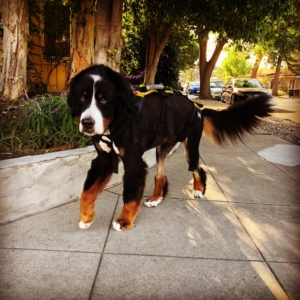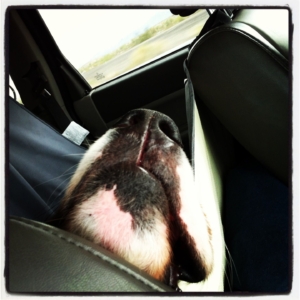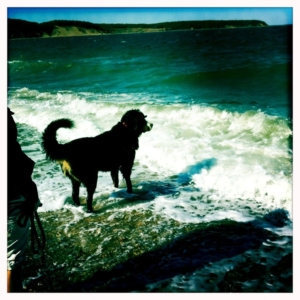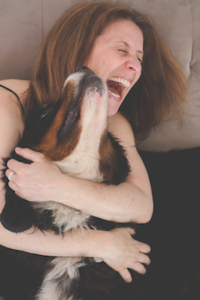Permutations of Love
 I. Lester is a beautiful Bernese mountain dog who stops traffic—literally. People pull their cars over to ask about him. He’s been in commercials. As a result of living in Los Angeles, he knows how to find the craft services table at any film shoot and charm a Teamster into giving him bacon; as a result of having been raised in New York City, he knows how to wait at the curb for car service. He has a big vocabulary and a well-trained owner (me). He used to be a solid 125 pounds, but he’s down to a skinny 105 as a result of degenerative myelopathy—canine ALS—with which he was diagnosed in August of 2018. I hate to admit that it’s easier for me to lug him around in his special double-handle harness now that he’s lost all the muscle mass in his back legs, but it is. The harness is a brilliant invention that, after a year and a half of use, has given me a pinched nerve in my cervical spine and a torn something or other in my shoulder for which I started physical therapy in January. It may be time to get Lester a quad wheelchair, though if I could find a big enough Radio Flyer with an industrial-strength ramp that he’d actually use, I’d get that instead—I love the idea of pulling him around the neighborhood in his bright red cart so he can visit all his friends. Every two weeks, he goes to our vet, Dr. Lisa, for acupuncture. This treatment, for dysplasia that predates the degenerative myelopathy, has been ongoing since 2016. I’m a freelance writer—barring an unexpected windfall, it will probably take me years to recover financially from caring for Lester, even though I split the cost with my ex-boyfriend. Love takes many forms.
I. Lester is a beautiful Bernese mountain dog who stops traffic—literally. People pull their cars over to ask about him. He’s been in commercials. As a result of living in Los Angeles, he knows how to find the craft services table at any film shoot and charm a Teamster into giving him bacon; as a result of having been raised in New York City, he knows how to wait at the curb for car service. He has a big vocabulary and a well-trained owner (me). He used to be a solid 125 pounds, but he’s down to a skinny 105 as a result of degenerative myelopathy—canine ALS—with which he was diagnosed in August of 2018. I hate to admit that it’s easier for me to lug him around in his special double-handle harness now that he’s lost all the muscle mass in his back legs, but it is. The harness is a brilliant invention that, after a year and a half of use, has given me a pinched nerve in my cervical spine and a torn something or other in my shoulder for which I started physical therapy in January. It may be time to get Lester a quad wheelchair, though if I could find a big enough Radio Flyer with an industrial-strength ramp that he’d actually use, I’d get that instead—I love the idea of pulling him around the neighborhood in his bright red cart so he can visit all his friends. Every two weeks, he goes to our vet, Dr. Lisa, for acupuncture. This treatment, for dysplasia that predates the degenerative myelopathy, has been ongoing since 2016. I’m a freelance writer—barring an unexpected windfall, it will probably take me years to recover financially from caring for Lester, even though I split the cost with my ex-boyfriend. Love takes many forms.
II. Some people like to compare my love for Lester to the love I’d have for a child, but the analogy doesn’t work for me. I never wanted kids, or marriage, and while I enjoy subverting the narrative that is often assumed about my life—that of a middle-aged, single woman who did something wrong and therefore lost out on the chance to be someone’s mother and someone else’s wife—there’s no satisfaction to be had at the end of these conversations because, generally, people don’t believe women who say they never wanted a spouse or a baby. Though we live in a time when women can (ostensibly) be and do all things, reductive assumptions about our “real” purpose prevail, so I see rejecting motherhood and marriage as an act of resistance. Unfortunately, it is also an act of dream-crushing—more specifically, of denying my lovely parents, whose relationship is approaching six successful decades, the grandchildren I know they’d love to have. I see myself as a disappointment in this regard, which makes it hard to get out of bed sometimes.
III. I loved the cars my parents had when I was a kid—they were my pets, before I was allowed to have a dog. I named some of them, and worried about their comfort as they sat outside braving snow, sleet, and rain. There was Tank, a battleship-gray Volvo with white leather interior that made me feel like I was on the USSEnterprise with my mother at the helm; a citrus-green Chevy Nova—whose name has been lost to time—with irresistibly textured seat covers, that turned errands with my dad into a special event; Lurfie, a fern-colored Plymouth Volare station wagon with felt fabric that sagged elegantly above our heads like the Bedouin tents in Lawrence of Arabia; and the Purple Monster, a Mercury Marquis station wagon whose unfixable oil-burning problem is the reason I know how to check a dipstick. When I was learning to drive, my older brother and I took the Purple Monster to a church lot so I could practice parking. My brother was a good teacher—it wasn’t his fault that I got too close to the only other car there. Its side mirror shattered our passenger window, covering my brother’s head, chest, and arms in safety glass that glittered in the late afternoon sun, rendering him magical, something I’d always suspected.
 IV. Many years later, my brother would help me move across the country in a borrowed, steel-blue Jeep Grand Cherokee named Lola with a backseat tailormade to accommodate Lester’s lounging and sight-seeing needs. I was in pursuit of a TV-writing job after meeting with an agent in New York who happened to say, at the exact moment that my relationship was imploding, “You should move to LA.” Once I relocated, it took four years to get meetings with other potential agents. (First I had to do the work of meeting The Right People, who knew Other Right People, who had to convince More Right People that I was worth the effort.) In one of those meetings, I was asked if I was “diverse.” I said no, because I’m white and don’t identify sexually in any particular way. Later, I was talking to a much younger friend of mine, who was also going on these meetings, and she said, “Why didn’t you say yes? You identify as queer, right?” And I said, “Ummm…” And she said, “Didn’t you have a long-term relationship with a woman?” And I said, “I did.” And she said, “So?” And I said, “It feels deeply cynical to me to claim I’m part of a community so I can get a job.” And she said, “But who are you attracted to?” And I said, “Is that how one determines how to identify?” And she rolled her eyes and said, “Didn’t you go to Vassar?”
IV. Many years later, my brother would help me move across the country in a borrowed, steel-blue Jeep Grand Cherokee named Lola with a backseat tailormade to accommodate Lester’s lounging and sight-seeing needs. I was in pursuit of a TV-writing job after meeting with an agent in New York who happened to say, at the exact moment that my relationship was imploding, “You should move to LA.” Once I relocated, it took four years to get meetings with other potential agents. (First I had to do the work of meeting The Right People, who knew Other Right People, who had to convince More Right People that I was worth the effort.) In one of those meetings, I was asked if I was “diverse.” I said no, because I’m white and don’t identify sexually in any particular way. Later, I was talking to a much younger friend of mine, who was also going on these meetings, and she said, “Why didn’t you say yes? You identify as queer, right?” And I said, “Ummm…” And she said, “Didn’t you have a long-term relationship with a woman?” And I said, “I did.” And she said, “So?” And I said, “It feels deeply cynical to me to claim I’m part of a community so I can get a job.” And she said, “But who are you attracted to?” And I said, “Is that how one determines how to identify?” And she rolled her eyes and said, “Didn’t you go to Vassar?”
V. Vassar College, founded in 1861 as an institution of higher education for women, has a long history of being the butt of jokes in entertainment, referenced in everything from Some Like It Hot and Marx Brothers’ movies to Friends and The Simpsons. Some of the more recent references are made to imply that a character is obnoxiously woke, wielding the bleeding-edge language of identity politics to police the way others speak. I don’t think Vassar deserves such mockery, but I’m biased in its favor. Like all great schools, Vassar strives to be a place where students can transition to adulthood while learning how to think critically and figure out who the hell they are. It wasn’t until I got to Vassar that I realized I’m attracted to people regardless of gender or sexual identity. (Despite gender or sexual identity? Regardless of how they identify? Irrespective of identification? I should know how to say that—I went to Vassar.) What I think about these days more than whether or not I should be telling people I’m queer—either for myself or to stand in solidarity with the LGBTQ community—is the fact that I don’t currently want to share my life with someone else. I spent a total of a decade in two successful, long-term, committed relationships, navigating the complications of intimacy, and then decided that this decade would be about writing. (Many writers can multitask in this regard; I cannot.) It’s been years since I’ve been in love in the romantic sense, and I don’t miss the stress that it causes me. Recently, I had a brief interaction with a shaman-esque being in the vet’s waiting room, who watched me haul Lester up by his handles and said something to the effect of, “Taking care of the disabled is all-consuming—everything else shuts down so you can do it right. You’ll be that way until he’s gone. But hey, death is a part of love.”
 VI. The fact that Lester’s life, and most likely his death, rests almost entirely in my hands is overwhelming and humbling. The anticipation of the decisions to be made and the logistics of carrying out those decisions makes me feel trapped, and I wish the pressure—financial, emotional—would just end. But every two weeks at acupuncture, I exhale the breath I am forever holding once Dr. Lisa agrees that Lester still wants to be here. She renews her promise to tell me when she thinks that’s changed, and off he and I go, slipping on the stupid traction-less floor in the lobby that makes him seem to be in even worse shape than he is. Once we make it through the parking lot to Mad Max—our zoomy magnetic-grey Toyota CH-R—he tries to climb up into the backseat and I try to help him with my good arm. Once we’ve navigated that and he’s strapped in, he receives treats and ice cubes, crunching with aplomb, still high off the star treatment lavished on him by Dr. Lisa and her team. We drive home listening to The Daily or Armchair Expert, and discuss the dogs we met in the waiting room. At stoplights, he worries about who I’ll love when he’s gone.
VI. The fact that Lester’s life, and most likely his death, rests almost entirely in my hands is overwhelming and humbling. The anticipation of the decisions to be made and the logistics of carrying out those decisions makes me feel trapped, and I wish the pressure—financial, emotional—would just end. But every two weeks at acupuncture, I exhale the breath I am forever holding once Dr. Lisa agrees that Lester still wants to be here. She renews her promise to tell me when she thinks that’s changed, and off he and I go, slipping on the stupid traction-less floor in the lobby that makes him seem to be in even worse shape than he is. Once we make it through the parking lot to Mad Max—our zoomy magnetic-grey Toyota CH-R—he tries to climb up into the backseat and I try to help him with my good arm. Once we’ve navigated that and he’s strapped in, he receives treats and ice cubes, crunching with aplomb, still high off the star treatment lavished on him by Dr. Lisa and her team. We drive home listening to The Daily or Armchair Expert, and discuss the dogs we met in the waiting room. At stoplights, he worries about who I’ll love when he’s gone.
Louise Rozett is the author of the Confessions series (Confessions of an Angry Girl, Confessions of an Almost-Girlfriend) published by HarlequinTEEN, and a pilot, based on the series, that won best half-hour original script at the Austin Film Festival. Her play Break, about the effects of the 9/11 recovery effort on the recovery workers and their families, was a finalist for the Stanley Drama Award; was workshopped at New York Stage & Film; and will be published by Broadway Play Publishing in 2020. She is a graduate of Vassar College and the MFA acting program at The Theatre School at DePaul University. Visit Louiserozett.com for more.
Photo credit: Ericka Kreutz





